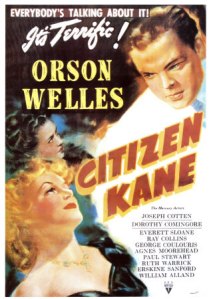Rating: 4 stars (out of 4)
Citizen Kane (1941): Dir. Orson Welles. Written by Herman J. Mankiewicz and Orson Welles. Starring: Orson Welles, Joseph Cotton, Ruth Warrick, William Alland, and Dorothy Comingore. Running time: 119 minutes.

I’ve always been skeptical of superlatives. And in this review I attempt to tackle that grand pubah of superlatives, Citizen Kane. Even people who haven’t seen Kane know about its reputed status as “the greatest of all time.” It is a film spoken of in solemn tones, worshipped deep within the hallowed halls of film history, by a cult of savages called film critics. The film practically screams elitism.
I’ll be honest, I really didn’t want to like it. You know who never liked it? Ingmar Bergman. And it wouldn be cool to be in the same company as Bergman, if only in the field of “Citizen Kane disdain”? Well, I’m sure he’d be better company than the critics anyway.
Luckily my biases scatter when I sit down to watch a film. So I sat and I watched it. And to my surprise, I found myself…moved. How strange.
Amidst its stylized lighting, its in-your-face cinematography, its compulsively controlling main character, I saw fragments of a life.
Citizen Kane is just that: a film of fragments. It draws its power not only from what we see, but what we don’t. It acknowledges that we can never know newspaper mogul Charles Foster Kane fully, while still allowing us to see glimpses of what might have been his life.
The majority of the film is fittingly told in flashback, as a group of shadowy (and I mean figuratively and literally) newsreel reporters attempt to learn the meaning of Kane’s now infamous final words (or rather, word): “Rosebud.”
And so the reporters pursue everyone who “knew” Kane during his life. As the newsreel producer commands them: “Get in touch with everybody that ever worked for him. Whoever loved him, whoever hated his guts.” We hear of these stories, the fragments that people remember, and the biases they bring with them.
We see his childhood, so suddenly cut off. We then trace his life from his first newspaper acquisition, to his first marriage, to his bid for the New York governorship, to the ensuing scandals, and finally to his decline within the walls of the palace built to honor himself. The memory of Kane flares between nostalgia and ill will, testament not only to the Kane character, but to the personalities of the people telling the story.
I can best describe the supporting actors’s performances as “admirably appropriate.” They do not so much play people as bits of memory, eschewing realism for impressionism. Some try to help him. Some try to bring him down. But none ever truly understand him.
Welles as Kane, of course, is the stand-out. He can be charming, erudite, even friendly—but he can also be aloof, tempemental, and back-stabbing. Welles plays Kane as if he were the only actor in the frame. And while this may fit well with Welles’s own ego, it also feels immensely appropriate for the main character, whose ambitions blind him to the plights of the people around him.
Yet through it all, Kane remains a very sympathetic character. In spite of his ego, in spite of the diabolical things he does, and in spite of rarely showing love for anyone other than himself, somehow we care about this megalomaniac. We care because we see that he has lost something, and we see how, unsuccessfully, he attempts to find it again. I won’t say what “it” is, because the film leaves what “it” is open-ended.
Talk about this film tends to stray from human aspect. That’s a real shame, because the humanity here is quite potent. Without investing us in the characters, the technical achievements in cinematography mean nothing. They are window-dressing.
Technical achievements must be anchored in the content of the film, and Kane knows this. One of its most iconic scenes comes toward the end of the film. A weary Kane trudges to his bedroom, and walks past a large mirror, casting reflections to infinitude. A stirring sight, yes, but in the context of the film, and all the time we have invested in the character, the sight is…well, so much more.
I still resent titles like “Greatest Film of All Time.” It’s like we have this compulsive need to say, “Okay! We’ve found it! Nothing could possibly be better! Let’s pack it up and go home!”
Can’t anything be great in its own right? Well, in that sense, Citizen Kane is a great film, at least in the eyes of this reviewer. It need not reside in the hallowed halls of film history.
70 years after its release, Kane waits for any open-minded viewer. It is not only masterful film, but perhaps more importantly, it’s a heartbreaking one.